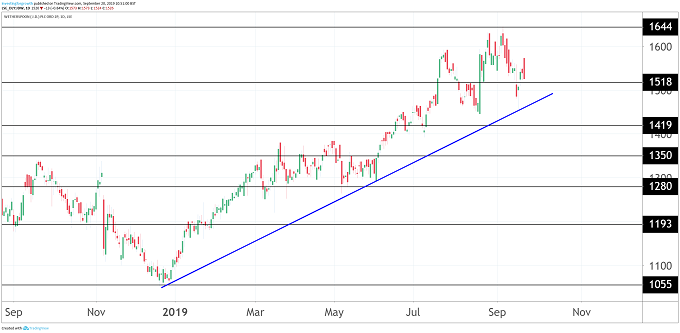Stockwatch: Cheap and cheerful, but what about the shares?
Shareholders have been rewarded, but our companies analyst thinks the growth rating needs discussing.
20th September 2019 11:07
by Edmond Jackson from interactive investor
Shareholders have been rewarded, but our companies analyst thinks the growth rating needs discussing.

Are the mid-cap shares in pubs group JD Wetherspoon (LSE:JDW) overvalued and exposed – at around 1,550p they trade on a forward price/earnings (PE) ratio of 20 times, 5 times book value and yield just 0.8% - or is this the quintessential "Brexit stock" set to thrive whatever happens after October 31?
A marketing success overseen by founder-chairman Tim Martin is renowned for a wide range of food and drink at the keenest prices: food days specialising in steak, curry, fish & chips, traditional dishes, trendy breakfasts and, nowadays, vegan menus plus coffee with unlimited refills.
Over 40 years of running pubs he has justifiably earned a reputation as "the Sam Walton of British business" with continued attention to detail.
Though a recession could force some customers to rely more on cheaper alcohol from supermarkets, it's possible they're substituted by others trading down from pricier pubs. In marketing terms it's a success story able to roll on.
Checked by margin and valuation issues?
I would distinguish such hurdles now because Wetherspoon is assumed to be a safe tuck-away.
While annual results to 28 July show like-for-like sales up 6.8%, or 7.4% overall to £1,819 million, operating profit (before disposals) is down 0.3% to £131.9 million and by 4.5% to £102.5 million at the pre-tax level. This is the result of not passing on higher drink costs to customers, where the cost of a pint of beer in pubs generally has risen 3.3% to £3.92 over 12 months to end-June. However, Wetherspoon's food prices did creep up in its second half year.
It means Wetherspoon's average price discount to the industry has risen from 19% in 2016 to 25% nowadays, a clear advantage for poaching customers in challenged times, although it is starting to have some margin effect – easing from 7.2% to 6.9% at the operating level, the first decline since 2014.
Possibly the crux is whether margins have peaked in a context of chasing sales, and where the stock context is high.
Secondly, valuation is a contrast to nine years ago when I drew attention to Wetherspoon's on 11 times forward earnings, a buyback programme underlining the board's belief in value. In those days I was keen on pub shares attuning their menus - Young & Co (LSE:YNGA) also – with eating/drinking out being central to British culture. Wetherspoon's new menu and breakfast sales had driven sales growth from 4.3% to 7.3% at the time.
Earlier this month, Wetherspoon shares hit an all-time high of 1,625p despite most having a difficult summer: mid-August's £4.6 billion takeover of Greene King (LSE:GNK)) made at a 25% premium to net asset value, reflecting belief in exacting further value. Yet Wetherspoon's shares retreat to around 1,550p - 5.5x net tangible assets – shows the market capable of seeing froth on a stock besides a pint.

Source: TradingView Past performance is not a guide to future performance
What of the broader context for costs?
The stock has become quite volatile this summer, trading between 1,460p and 1,625p: I should be careful not to succumb to "confirmation bias" of suspecting a top, though it would appear to reflect more division of views on costs and value. Initially, in response to preliminary results, the price dropped to 1,486p then rebounded to 1,550p. Given about 64% "free float," this should not reflect a tight market.
To some extent a large pubs group like this can subsidise low-cost drink according to its wider cash flow profile. In its last financial year, Wetherspoon opened five outlets and sold or closed nine – although that still meant nearly £150 million investment versus £9.3 million proceeds from sale of property.
Almost £174 million net cash generated from operations supported this, but explains why, even though a modest £12.7 million went on dividends, the payout policy remains static. The overall cash flow profile also implies costs weigh on Wetherspoon’s ability to so discount its drink versus competition.
| J D Wetherspoon - financial summary | |||||||
|---|---|---|---|---|---|---|---|
| year ended 29 Jul | |||||||
| 2013 | 2014 | 2015 | 2016 | 2017 | 2018 | 2019 | |
| Turnover (£ million) | 1,281 | 1,409 | 1,514 | 1,595 | 1,661 | 1,694 | 1,819 |
| Net profit (£ million) | 46.2 | 41.4 | 44.8 | 51.2 | 56.6 | 66.7 | 72.8 |
| Operating margin (%) | 7.1 | 8.1 | 6.2 | 6.7 | 7.2 | 7.2 | 6.9 |
| IFRS3 earnings/share (p) | 36.6 | 32.8 | 36.7 | 43.4 | 50.8 | 63.2 | 69.0 |
| Normalised earnings/share (p) | 51.7 | 48.3 | 47.0 | 48.3 | 80.1 | 81.7 | 75.9 |
| Price/earnings multiple (x) | 20.3 | ||||||
| Operational cashflow/share (p) | 91.3 | 115 | 135 | 111 | 159 | 167 | 165 |
| Capital expenditure/share (p) | 32.5 | 44.9 | 36.6 | 28.4 | 52.6 | 65.3 | 51.5 |
| Free cashflow/share (p) | 58.9 | 69.9 | 98.5 | 82.6 | 107 | 102 | 113 |
| Dividend per share (p) | 12.0 | 12.0 | 12.0 | 12.0 | 12.0 | 12.0 | 12.0 |
| Dividend yield (%) | 0.78 | ||||||
| Covered by earnings (x) | 3.1 | 2.7 | 3.1 | 3.6 | 4.2 | 5.3 | 5.8 |
| Net assets per share (p) | 171 | 185 | 187 | 183 | 237 | 272 | 301 |
| Source: historic Company REFS and company accounts |
Bull and bear views arising
Analysts at Peel Hunt reckon there's actually scope to raise drinks prices "and the profit sensitivity to this is large, as we saw in 2017 when earnings rose by 43%. Higher pricing is the catalyst if unlikely to occur at this stage in the political cycle while the chairman is highlighting cost/pricing benefits to customers." Hence, they maintain a ‘hold’ recommendation, albeit cautiously in the sense of raising their share price target from 1,300p to 1,450p.
Wetherspoon guides for 10-15 new pubs this financial year and an £8 million rise in operating profit. However, a new accounting standard for leases (IFRS 16) will apply, and a £22 million rise in the interest charge imply a £14 million fall in pre-tax profit. Net debt has edged up £10 million to £737 million (chiefly long-term debt), helping to support share buybacks and freehold conversions, so a £35.1 million net finance charge in the last financial year was covered 3.8 times by operating profit. Might it be the stock's recent volatility foreshadows similar in the headline numbers?
I'm concerned at buybacks at levels apparently a premium to underlying value, as if propping the stock: objectively shareholders ought to prefer a progressive dividend policy, although buybacks haven't been huge lately - 31,750 at around 1,290p in May and 125,000 at 1,508p in recent days.
Shore Capital retain a 'sell' stance despite strong current trading, with like-for-like sales up 5.6% in the six weeks to 8 September, given Wetherspoon's premium value not only to peers but also its pre-2008 financial crisis highs. They also see some modest downside risk to market forecasts where I note consensus for net profit of £79.2 million versus £72.8 million this last year.
Can the stock defy a rationally wary stance?
On key numbers then, you wouldn't be a buyer and you could conclude 'sell' because, in due course, the summer's sideways volatility could give way to fewer buyers and where a large number of holders will be cognisant to protect gains. So, it's possible that, overall, sellers may get the upper hand.
Obviously, you could have thought this enough times in recent years and, I'll be honest, I was a fan of Wetherspoon years ago, and I've failed to update partly because it's been a hard call either way. On 20 times earnings and zilch yield, however, it's clearer to doubt whether a growth rating is deserved.
This is not to question the business but stock valuation. The food and drink offering is deservedly a mass market success, likely to mean relatively stable cash flows to many other plc's should recession strike. After a general election there might even be some change to supermarket's advantages in business rates and VAT, enabling them to price alcohol lower.
The Social Market Foundation has just argued "problem drinking" would reduce if home-drinking was made less affordable, although supermarkets might still find other means to keep alcohol prices low to attract shoppers initially.
My conclusion is a sideways consolidation likely in the short to medium-term, the dilemma being no worthwhile yield for holding risks.
Yes, it's possible Wetherspoon does push through rises in drinks' prices, even radicalises its menu to profit from a surge in vegan eating, to re-rate earnings. As things stand, however, the stock's risk/reward profile is unattractive.
Long-term holders may prefer to weigh these risks versus taxation liabilities arising, although I think the broad stance is to bank at least some profits – and see how Wetherspoon's pricing evolves. Sell.
Edmond Jackson is a freelance contributor and not a direct employee of interactive investor.
These articles are provided for information purposes only. Occasionally, an opinion about whether to buy or sell a specific investment may be provided by third parties. The content is not intended to be a personal recommendation to buy or sell any financial instrument or product, or to adopt any investment strategy as it is not provided based on an assessment of your investing knowledge and experience, your financial situation or your investment objectives. The value of your investments, and the income derived from them, may go down as well as up. You may not get back all the money that you invest. The investments referred to in this article may not be suitable for all investors, and if in doubt, an investor should seek advice from a qualified investment adviser.
Full performance can be found on the company or index summary page on the interactive investor website. Simply click on the company's or index name highlighted in the article.
Disclosure
We use a combination of fundamental and technical analysis in forming our view as to the valuation and prospects of an investment. Where relevant we have set out those particular matters we think are important in the above article, but further detail can be found here.
Please note that our article on this investment should not be considered to be a regular publication.
Details of all recommendations issued by ii during the previous 12-month period can be found here.
ii adheres to a strict code of conduct. Contributors may hold shares or have other interests in companies included in these portfolios, which could create a conflict of interests. Contributors intending to write about any financial instruments in which they have an interest are required to disclose such interest to ii and in the article itself. ii will at all times consider whether such interest impairs the objectivity of the recommendation.
In addition, individuals involved in the production of investment articles are subject to a personal account dealing restriction, which prevents them from placing a transaction in the specified instrument(s) for a period before and for five working days after such publication. This is to avoid personal interests conflicting with the interests of the recipients of those investment articles.